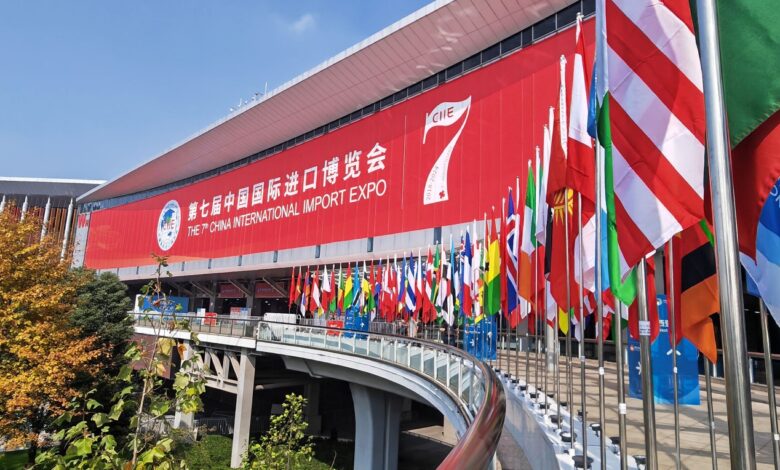This Year Marks a Milestone in China-Africa Relations

The year 2024 has seen a significant leap in the growing relationship between China and Africa, with the September Summit of the Forum on China-Africa Cooperation (FOCAC) serving as a key turning point. During the summit, China made a major announcement, committing to unilaterally expand its market and support African products through key platforms such as the China International Import Expo (CIIE). Two months later, the 7th CIIE, held in Shanghai, provided a global stage for African goods and sparked new investment talks, demonstrating China’s dedication to creating ample opportunities for African businesses.
Expanding Market Access for Africa
Since its inception in 2018, the CIIE has become a vital platform, leveraging China’s vast market to facilitate international procurement, investment promotion, and economic cooperation. The expo has played an essential role in helping African nations introduce their agricultural products to the Chinese market. With China’s expanding openness, more African exports are now poised to thrive.
Ethiopian coffee, for example, has become a well-recognized product at the CIIE. Ruth Wondosen Tesfaye, from Addis Coffee, shared that the expo offers a unique opportunity for Ethiopian coffee to reach a broader consumer base. “CIIE allows us to engage directly with consumers and distributors, and China’s growing demand for unique products, like our coffee, is a tremendous opportunity for our businesses,” she said.
This year also marked the debut of Madagascar’s mutton products at the CIIE. In September, China imported its first mutton from Africa when products from Madagascar were cleared at Changsha Customs. Michel Anondraka, the director general of agriculture and livestock at Madagascar’s Ministry of Agriculture and Livestock, highlighted the huge potential that the Chinese market holds for local livestock farmers, noting that it would aid in agricultural modernization in Madagascar.
Other African products like Tanzanian honey and South African avocados also made their debut at the expo. Tanzanian honey producer Jackson Mponela emphasized the significance of the CIIE, stating that the event not only provides access to the Chinese market but also boosts Tanzanian honey’s position in the global market. Similarly, Nkateko Khoza, CEO of Khozeni Farming in South Africa, shared optimism about the future of the avocado industry, predicting substantial growth within the next few years as a result of the CIIE opportunity.
Policy Support and Trade Expansion
A key driver of China-Africa trade cooperation has been China’s policy support for African participation in initiatives like the CIIE. Under the framework of FOCAC, there have been several measures aimed at easing the trade process, including the creation of a “green channel” for African agricultural products, faster inspection and quarantine procedures, and expanded tariff exemptions. These efforts have benefitted African industries, such as flowers, avocados, coffee, and citrus fruits.
As a result, Africa’s exports to China have surged. According to the General Administration of Customs, China’s imports from Africa reached 626.74 billion yuan (approximately 87 billion U.S. dollars) in the first nine months of 2024, marking a 10.3 percent year-on-year increase. For instance, the CIIE provided Mauritian sugar, which benefited from the China-Mauritius Free Trade Agreement (FTA) established in 2021, with an invaluable opportunity to enter the Chinese market. Devesh Dukhira, CEO of the Mauritius Sugar Syndicate, acknowledged the long-term benefits of this partnership, thanks to both the FTA and CIIE.
Focus on the Global South
This year’s CIIE also highlighted the role of the Global South, with the 7th Hongqiao International Economic Forum focusing on “Sustainable Development of the Global South and China-Africa Cooperation.” The forum aimed to offer insights into fostering inclusive growth for least developed countries, especially in Africa.
Philip Myburgh, the group head of trade at Standard Bank Business and Commercial Banking, pointed out that the CIIE plays a critical role in helping developing nations reduce poverty and achieve sustainable development by granting them access to new markets, investments, and technological advancements.
Moreover, during the FOCAC Beijing Summit, China announced a significant policy shift, offering zero-tariff treatment for 100 percent of tariff lines for the least developed countries, including 33 African nations. This bold move solidifies China’s position as a committed partner of Africa, marking a significant step in the ongoing South-South cooperation.
A New Era of Cooperation
Peter Kagwanja, Chief Executive at the Africa Policy Institute, emphasized that China’s opening of its market to Africa is a vital step in fostering deeper economic and trade ties. “China is a real and true friend of Africa,” Kagwanja said, reflecting on the monumental impact of China’s initiatives.
As the year unfolds, the expanded cooperation between China and Africa signifies a promising future. With China’s continued commitment to opening its doors to African products and furthering South-South cooperation, the 2024 milestones in China-Africa relations are sure to yield lasting benefits for both regions, strengthening ties and creating new economic opportunities for Africa’s diverse markets.
Join 'Lesotho News' WhatsApp Channel
Get breaking Lesotho news — delivered directly to your WhatsApp.
CLICK HERE TO JOIN



